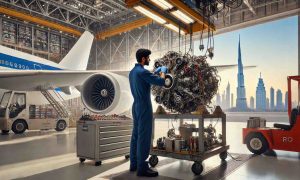

With the aviation industry rapidly evolving, 2025 promises to be a groundbreaking year for new technologies, sustainability, and passenger experience improvements. Across key regions, aviation conferences will serve as hotspots for unveiling these trends and innovations. Here, we break down the top aviation trends expected to dominate in 2025 and highlight some of the most influential players.
1. Sustainable Aviation and Decarbonization
As environmental concerns grow, aviation is under increasing pressure to reduce its carbon footprint. This year, sustainability is a focal point at many conferences, with airlines and manufacturers working to adopt more eco-friendly practices. Sustainable Aviation Fuel (SAF) is gaining momentum as a viable alternative to traditional jet fuel, significantly cutting down on emissions. Companies like Etihad Airways in the UAE are at the forefront, experimenting with SAF and other green technologies (Etihad Airways).
In Europe, Airbus has taken a leading role by investing in hydrogen-powered aircraft as a long-term solution. Airbus’ ZEROe concept aims to deliver the world’s first zero-emission commercial aircraft by 2035, a key step toward achieving the industry’s sustainability goals. This ambitious project has made Airbus a central figure in the push for a more sustainable future (Airbus). Additionally, the aviation sector in India is exploring electric aircraft as an alternative, with companies like Tata Group investing in green aviation technologies.
Another major element of sustainable aviation is waste reduction within airports and onboard flights. With the rise of circular economy initiatives, airports in Dubai and across the Middle East are implementing recycling programs and sustainable design practices to minimize environmental impact. This trend is expected to be a significant topic at the Dubai Airshow 2025, as the region seeks to balance growth with sustainability.
2. Advanced Air Mobility (AAM) and eVTOL Technology
Advanced Air Mobility (AAM) is revolutionizing urban transportation, offering quicker travel options within and around cities. Electric Vertical Takeoff and Landing (eVTOL) aircraft are a key part of this trend, with companies such as Lilium in Europe and EHang in China leading development. eVTOL aircraft promise a future of air taxis, short-distance flights, and cargo transportation within cities, addressing congestion while offering a green alternative (Lilium, EHang).
Dubai is actively pursuing AAM solutions, with partnerships between Dubai’s Roads and Transport Authority and global eVTOL companies. These efforts underscore the UAE’s ambition to become a global leader in urban air mobility, with test flights already underway. This year’s aviation conferences in Dubai and the Middle East are expected to highlight the region’s plans to integrate eVTOLs and air taxis into the transport network by 2030.
China has also prioritized AAM, with multiple cities exploring the integration of autonomous air mobility solutions. The Zhuhai Airshow in China will likely feature advancements in eVTOL technology and demonstrate how urban air mobility can be safely and efficiently incorporated into densely populated urban environments. This interest underscores a global movement towards more flexible and sustainable urban transport options.
3. Digital Twins and Predictive Maintenance in MRO
Digital Twin technology is transforming the Maintenance, Repair, and Overhaul (MRO) sector by creating digital replicas of aircraft components and systems. These digital twins enable predictive maintenance, allowing for real-time monitoring and early detection of potential issues. In the UK, Rolls-Royce is pioneering the use of digital twins to enhance engine maintenance, improving safety and efficiency while reducing costs (Rolls-Royce).
In Dubai, Emirates Engineering is incorporating predictive maintenance into its operations, utilizing AI and digital twins to forecast maintenance needs before issues arise. This technology will be a key focus at the MRO Middle East 2025 conference, where experts will discuss the benefits of predictive maintenance and how it can help streamline operations, reduce aircraft downtime, and minimize operational costs.
Europe and China are also exploring digital twin technology to enhance MRO services. In China, companies like COMAC are partnering with tech firms to apply digital twins in aircraft design and lifecycle management. By leveraging predictive maintenance, these companies aim to improve operational efficiency and safety across the board, which will be a central theme at aviation events in these regions.
4. Artificial Intelligence (AI) in Airport Operations
Artificial Intelligence (AI) is playing a growing role in enhancing airport operations, from streamlining security checks to optimizing baggage handling and customer service. In Europe, Heathrow Airport in London has implemented AI-driven systems to improve passenger flow and reduce wait times. Such advancements aim to enhance the passenger experience while ensuring safety and efficiency (Heathrow Airport).
In the UAE, Dubai International Airport has embraced AI through facial recognition technology and smart security lanes, reducing check-in times and enhancing passenger convenience. This topic is expected to be a highlight at the Airport Show Dubai 2025, where AI applications in airports will be discussed alongside other innovative technologies like biometric boarding and automated customer service.
China and India are not far behind in AI adoption. In China, Beijing Capital International Airport has deployed AI-based systems for real-time passenger flow analysis, improving airport management. Indian airports, such as Mumbai International Airport, are also integrating AI solutions to manage traffic and enhance passenger service, making AI a critical topic at Indian aviation conferences.
5. Air Cargo and Logistics Advancements
The air cargo sector is experiencing unprecedented demand due to the rise of e-commerce and supply chain complexities. In the Middle East, Qatar Airways Cargo has been instrumental in meeting global demand, with a focus on pharmaceutical logistics and temperature-controlled shipments. This year, conferences in the UAE will showcase how air cargo companies are evolving to address market needs (Qatar Airways Cargo).
In Europe, DHL Express is expanding its fleet and optimizing its logistics operations to improve delivery speeds and reduce emissions. With hubs across Europe, DHL is setting new standards in air logistics by investing in digital tools and sustainable practices, which will be a key focus at European aviation events (DHL).
India’s air cargo sector is also growing rapidly, with SpiceXpress playing a significant role in providing logistical solutions across the country and beyond. China’s SF Express is similarly expanding its reach, with advanced technology for tracking and efficiency. Conferences in India and China will highlight these advancements in logistics and explore future opportunities in air cargo.
6. Air Traffic Management and Autonomous Technology
As air traffic grows, effective air traffic management (ATM) is essential for ensuring safety and reducing delays. Autonomous systems and AI-driven tools are transforming ATM by automating certain tasks and improving airspace management. EUROCONTROL in Europe is leading the way in developing automated systems that reduce human error and enhance efficiency (EUROCONTROL).
Dubai is also advancing ATM with autonomous technology to manage its increasingly complex airspace, with investments in smart control towers and AI-based flight monitoring systems. This year’s Global Air Traffic Management Conference in Dubai will cover these innovations, focusing on AI applications in air traffic control and future challenges in airspace management.
In India and China, rapid aviation growth has increased demand for efficient ATM solutions. The Airports Authority of India (AAI) and Civil Aviation Administration of China (CAAC) are implementing new technologies to improve traffic flow and reduce congestion. These innovations, alongside autonomous ATC systems, will be central topics at the aviation conferences in these countries.
7. Aviation Investment and Financing Trends
Investment in aviation is essential for advancing technology and meeting industry demands. Dubai has become a hub for aviation investment, with initiatives supporting airlines, infrastructure, and innovation. The Dubai Airshow 2025 is set to be a key platform for discussing investment trends, bringing together investors and aviation leaders to explore funding opportunities and partnerships.
In the UK, aviation investment is focused on enhancing airport infrastructure and adopting sustainable practices. British Airways and Virgin Atlantic are receiving government support for green initiatives, including SAF projects, which will be highlighted at UK-based conferences (British Airways, Virgin Atlantic).
China’s aviation sector, supported by the government, is one of the fastest-growing, with substantial funding for airline expansions and infrastructure projects. India is similarly attracting investment, with growing interest in airports and domestic carriers. Aviation conferences in both countries will focus on opportunities and challenges in aviation financing and infrastructure development.
References
- Emirates Airline Official Website
- Etihad Airways Official Website
- Airbus Official Website
- Rolls-Royce Official Website
- Lilium Official Website
- DHL Express Official Website
- EUROCONTROL Official Website
- Qatar Airways Cargo Official Website
- Heathrow Airport Official Website
- British Airways Official Website














